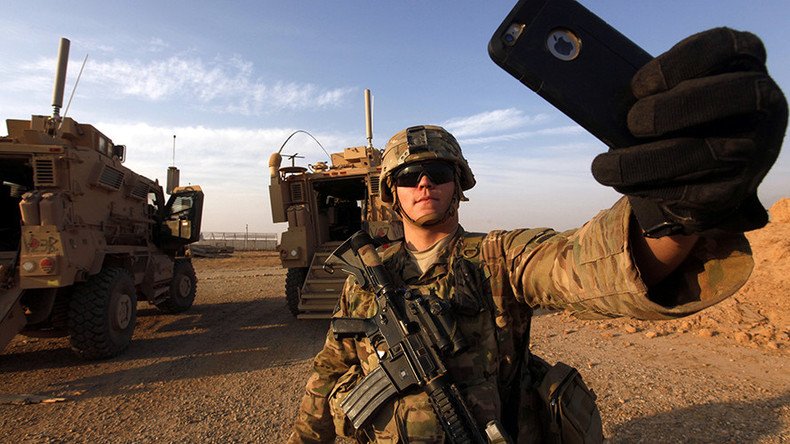Marine nude photo-sharing scandal prompts new social media policy

The Marine Corps introduced new social media guidelines in response to an ongoing nude photo-sharing scandal. The guidelines prohibit the posting of discriminatory content online, and all marines must sign an agreement that they have read and understood them.
The move comes as 20 new female marines have come forward acknowledging online harassment and lawmakers have introduced a bill to criminalize such behavior.
“Marines should think twice before engaging in questionable online activities, and must avoid actions online that threaten the morale, operational readiness and security, or public standing of their units, or that compromise our core values,” states the Marine Corps social media policy, which was issued by General Robert Neller, the Marine Corps commandant.
Marines issue new social media guidelines after nude photo scandal - https://t.co/shnnq710cr#GoogleAlerts
— Johnathan Chatman (@jlcmarketgrp) March 16, 2017
Questionable activities include any content or comments which are considered defamatory, threatening, harassing or discriminating “on the basis of race, color, sex, gender, age, religion, national origin, sexual orientation or other criteria.”
The policy guidelines come in response to revelations that hundreds, maybe thousands, of male marines have been posting and viewing online photographs of naked female marines without their consent.
The new policy makes it clear how existing rules and the Uniform Code of Military Justice (UCMJ) can be used to prosecute offensive, indecent or disrespectful online activities.
“But it creates no new laws, underscoring the legal quagmire posed by the internet and the constraints on military leaders posted by privacy laws and the First Amendment right of free speech,”reported AP.
A number of states have laws prohibiting so-called revenge pornography, and the military is looking at making a similar addition to its code, a change several senators are suggesting. Any law would have to show the poster’s intent was to harm an individual and that it had the intended effect – which could be difficult to prove.
#news Bill aims to outlaw future military photo scandals as NCIS works to identify Marines… https://t.co/A1XMEGadgShttps://t.co/WBRFHNUNLwpic.twitter.com/RrhD6HKegK
— majid (@majid_al7rbi) March 17, 2017
Congresswoman Jackie Speier (D-California) introduced a bill, the Servicemembers Intimate Privacy Protection Act, last Thursday to close a gap in the UCMJ to prohibit military service members from sharing intimate images without the consent of the individuals depicted.
“Marines United is just the tip of the iceberg. Websites with nude pictures of women in the military distributed without their knowledge and consent undermines our armed forces, unit cohesion and combat readiness. We must amend the UCMJ to make these acts illegal, so that future perpetrators will be held responsible,”said Speier, the ranking member of the House Armed Services Military Personnel Subcommittee.
“In 2013, I made it clear that these attacks undermined the morale of our troops…here we are four years later, and nothing has changed. The toxic rot that has pervaded our military culture had spread. Hundreds of women, in all branches of the military, continue to find their careers and their lives destroyed by the complete failures of military leaders to protect their troops and enforce their creed of good order and discipline.”
Getting ready to go live on @MSNBC to talk about my bill to stop abuse like #marinesunited -- SIPPA. pic.twitter.com/3YrSRHRh7X
— Jackie Speier (@RepSpeier) March 16, 2017
The guidelines are being issued as the Naval Criminal Investigative Service probes whether marines may have violated the UCMJ in sharing nude photos without the women’s consent and harassing them online.
So far, investigators have identified 1,200 screen names as members of the Facebook page, Marines United; of those, 725 were active duty marines, 150 were in the Marine Reserves, 15 were on active Navy duty, and the rest were unidentifiable. It is not known how many accessed or commented on the Google Drive linked to the Facebook page where the explicit photos were stored.
Marines issue new social media guidelines after nude photo scandal - https://t.co/nr1avyiDK4https://t.co/ZGUrhP5ZUFpic.twitter.com/bfc1bDFIiD
— FB strategies (@fbstrategiesx) March 16, 2017
An additional 20 women reported they were victims of the nude photo-sharing sites.
Officials said last week that at least 17 new sites were being reviewed and that as many as 30,000 images were catalogued on the sites, although many were duplicates.
Nude photo scandal rampant across US military, not just marines – report https://t.co/8Z0PEOf5sVpic.twitter.com/Pkmne4IGUp
— RT (@RT_com) March 10, 2017
A majority of photos were selfies and did not appear to have been taken surreptitiously, although it was not clear under what conditions they were shared.
The Marine Corps is not the only service making changes. The US Army is sending out a new message to its force, signed by senior leaders including General Mark Milley, the Army chief of staff, and warning soldiers that online misconduct is unacceptable “and passive tolerance of bad behavior by others is also wrong,” according to AP.
The Marine Corps is still the only branch of service with gender segregated boot camp, an issue that critics say creates double standards, feeds animosity toward female marines, and creates an atmosphere hostile to proper unit cohesion.












